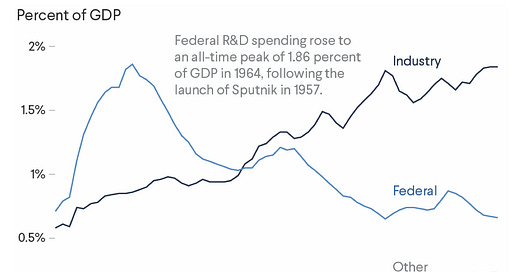Let it gush or: Let it bleed, part II
The other day I wrote about the lack of research spending by private businesses in favour of dividend payouts and share buybacks. If US businesses don’t invest in research, they risk losing the competitive advantage in the high-tech fields they currently dominate, such as IT and communication services. But, as one reader pointed out to me, a lot of R&D that used to be done in-house in the past (such as software development) is now bought off the shelf from specialist providers. Also, one could argue that private businesses don’t have to invest in research as long as they can tap into the fundamental and applied research done at universities and hire the best talents from elite institutions to work for them.
Unfortunately, when we look at the research spending in the United States as a whole, the picture is even direr than in the private sector alone. The Council on Foreign Relations last year published a lengthy assessment of the US investments in research and development and its implications for national security. The chart below shows the spending on research and development in the US per sector. While total research spending in private businesses has remained roughly stable since 2000 (though as I pointed out the other day, research spending on intellectual property has declined), federal spending on research has been in steady decline after the financial crisis.
Research spending as share of GDP in the United States

Source: National Science Foundation.
However, you may notice that the chart above ends in 2016 and since then, things have become much worse on the Federal level. The Trump administration has repeatedly tried to cut federal spending on crucial research programs by up to 100%. It is only thanks to Congress that instead of massive cuts, these research programs have seen small increases in funding. Matt Stoller recently showed the striking difference between the Trump administration’s plans for the budget and the Congressionally approved budget. Here is a chart from his post.

As the Council on Foreign Relations points out, these cuts in federal research grants would create a massive national security issue over time since it would reduce the competitiveness of US companies and the US military. The risk becomes obvious if total US research spending (federal + private + other sources) is compared to research spending in other countries. The US is about to be overtaken by China and loses its advantage vs. France, the UK, and other countries.
Total research spending by country

Source: OECD.
Unfortunately, we know that spending on research and development is highly correlated with future productivity growth, future economic growth and future profitability of private businesses. By neglecting these crucial investments the United States – both on the private business and on the federal level – is risking its prosperity and its position of economic and political dominance in the world.



